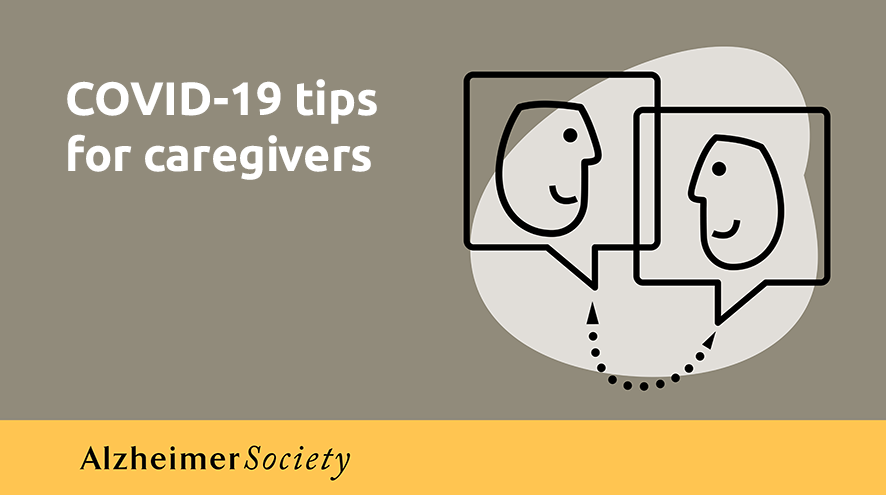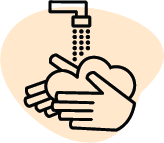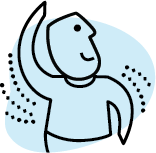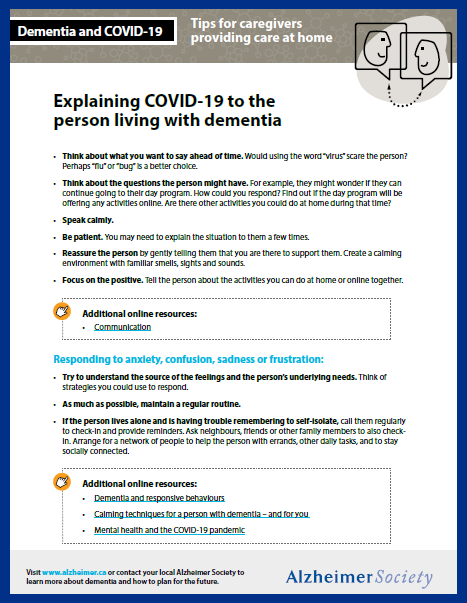COVID-19 tips for caregivers

Explaining COVID-19

- Explaining COVID-19
-
Think about what you want to say ahead of time. Would using the word “virus” scare the person? Perhaps “flu” or “bug” is a better choice.
Think about the questions the person might have. For example, they might wonder if they can continue going to their day program. How could you respond? Find out if the day program will be offering any activities online. Are there other activities you could do at home during that time?
Speak calmly.
Be patient. You may need to explain the situation to them a few times.
Reassure the person by gently telling them that you are there to support them. Create a calming environment with familiar smells, sights and sounds.
Focus on the positive. Tell the person about the activities you can do at home or online together.
Here are more helpful resources with communication tips:
- Responding to anxiety, confusion, sadness or frustration
-
Try to understand the source of the feelings and the person’s underlying needs. Think of strategies you could use to respond.
As much as possible, maintain a regular routine.
If the person lives alone and is having trouble remembering to self-isolate, call them regularly to check-in and provide reminders. Ask neighbours, friends or other family members to also check-in. Arrange for a network of people to help the person with errands, other daily tasks, and to stay socially connected.
Here are more helpful resources on mental health, stress and COVID-19:
Maintain hygiene

- If the person you are caring for needs help with handwashing, try these tips:
-
Demonstrate by washing your hands alongside the person. Follow the handwashing guidelines.
Provide step-by-step instructions verbally or through accessible instructions with large font and pictures.
Engage the person in the process and put their preferences first when possible. For example, ask them to choose between two soap scents.
Speak clearly and in a soothing tone.
Use 60% or higher alcohol-based hand sanitizer as an alternative if the person is unable to wash their hands with soap and water.
Here are more helpful resources about personal care, communication and dementia:
- If you are trying to help the person limit how often they touch their face, try these tips:
-
Keep their hands busy with activities they enjoy, like knitting or painting, or chores, like folding towels.
Do your best but accept that you may not be able to limit the number of times the person touches their face. Make it a habit to practice proper handwashing.
Take care of yourself

- Practice healthy habits
-
Remember to take care of yourself, too. Without taking care of yourself, it will be difficult for you to take care of others. Take some time in the day for you – even if it’s only for a few minutes.
Stay physically active. Exercise regularly. Go for neighbourhood walks with the person you are caring for. There are many free videos available online, through platforms like YouTube, that will guide you through an at-home workout.
Eat healthily. You can get healthy grocery items delivered to your home. Or, you can ask your friends, family or neighbours to run this errand for you.
Connect with others. Schedule daily calls with a family member or friend. Even a few minutes can help.
Take time to de-stress. Try stretching, yoga, taking deep breaths, or meditating. There are free videos available online, through platforms like YouTube, that will guide you through these activities. There are also free apps that you can download on your phone or tablet.
Get your sleep. Do your best to keep a regular sleeping schedule.
Be mindful of the coping strategies you use. Avoid unhealthy or excessive coping strategies like alcohol or drug use, smoking, binge eating, online shopping, etc. Seek support if you feel you need it.
- Other self-care considerations during COVID-19:
-
Ask for and accept help from neighbours, family or friends. Connect with your local Alzheimer Society to see how they can support you.
Limit your news consumption to one or two trusted sources. While it is important to stay informed, it is also important to be conscious of how the news is affecting you. Check your trusted news source once in the morning and once in the evening.
Try to maintain a routine.
Think about what makes you happy. Keep a special comfort item like a blanket nearby, prepare a cup of tea in the morning, or listen to your favourite song.
Take things day by day.
Focus on the positive, like how people are coming together to support each other. Look for examples of this in your own community.
Here are more helpful resources about mental health and COVID-19:
- If you are using technology to stay connected, remember:
-
Beware of scams. If you receive a suspicious message on social media, please report it. If you suspect an email is spam, ignore it and delete it. Do not click on any links or open any attachments, especially if these are unsolicited or use any kind of urgent language. If you are in doubt about whether something is legitimate, ask someone you trust. Report any suspicious websites or requests to the Canadian Anti-Fraud Centre.
Here are some helpful resources with instructions for using technology:
- Virtual visits toolkit (with information on using Zoom and Skype).
- Making video calls with FaceTime
Stay active at home

- Tips for leading activities in your own home:
-
Be creative. Look around your home to see what supplies you have available.
Be flexible. An activity that works one day may not work the next. Adjust as needed.
Be patient. Explain the activity step-by-step and enjoy the time you’re spending together. As long as the person is safe, don’t worry if they’re not doing the activity exactly “right.”
Provide direction and cuing. The person might need a little extra encouragement and guidance to get involved in the activity.
Do an activity that you both would enjoy.
Adapt the activity to the person. Consider the person’s likes, dislikes and current abilities.
Research whether activities you would normally do together are being offered online. Virtual museum, zoo and national park visits are some of the options available!
- Use this resource to create your own at-home physical activity plan (PDF)
- Check out the Dementia Activity Booklet from McGill University
- Together Apart: A guide to visiting from a distance
Connect with your local Alzheimer Society for more activity ideas.
- Some examples of activities you could try:
-
- Gentle exercises
- Watching your favourite tv shows or movies
- Listening to the radio, music, a podcast, or an audiobook
- Reminiscence activities (like asking the person to tell you about important events in their life or going through old photo albums together)
- Videocall a friend or family member
- Colouring
- Puzzles
- Crafts
- Going for a walk together
- Gardening (inside or outside)
- Reading
- Baking
- Playing cards
For more examples, watch the following webinar from the Alzheimer Society of British Columbia:
If you are living away from the person with dementia, try using technology to facilitate these activities. You can try listening to music together through streaming services, reading to the person over the phone, asking the person to tell you stories from their past, or playing an online game together.
For more ideas, see the following guide from the Alzheimer Society of Saskatchewan:
Here are helpful resources with instructions for using technology:
- Virtual visits toolkit (for tips on using Zoom and Skype).
- Making video calls with FaceTime
Stay connected

- Help the person follow physical distancing guidelines by using these tips:
-
Arrange for groceries, medications and other necessary supplies to be delivered to their home.
Stay connected to family, friends and neighbours. Now is a good time to use technology to stay in touch. Try using FaceTime, Skype or Zoom.
Follow public health guidelines around physical distancing.
Here are more helpful resources about COVID-19, physical distancing and dementia:
- Coronavirus (COVID-19): Tips for people with dementia, caregivers and families
- Physical distancing fact sheet
- Social distancing YES, social isolation NO
Here are helpful resources with instructions for using technology to stay connected:
- Virtual visits toolkit (with instructions for Zoom and Skype).
- Making video calls with FaceTime
- Virtual Visits: Making the most of videocalling
Know what to do if you get COVID-19

- Stay calm and plan ahead:
-
Make a list of important numbers and display it somewhere prominent. Include the numbers of your local public health unit, your healthcare provider, your local Alzheimer Society and emergency contacts.
Ensure that you have enough household supplies and medications on hand for two weeks.
Ask family members, friends and/or neighbours to help in case you’re unable to continue caring for the person due to illness or quarantine.
Have a back-up plan for if you become ill. Document detailed instructions for care. List the medications the person is taking and how often they need to take them.
Prepare a bag with essentials in case you need to go to the hospital (e.g. a set of clothes, personal care items, emergency contact information, important medical information like what medications they are taking, something that outlines the person’s advanced care wishes).
Here are more helpful resources about how to be ready for an emergency department visit:
- What to do if you suspect that you have COVID-19:
-
Contact your healthcare provider or local public health agency for guidance. Call ahead to tell them about your symptoms and follow their instructions for next steps.
Self-isolate for 14 days. Stay in a separate room if you live with others. If this is not possible, keep a minimum distance of 2-metres from others living in your home. Consult a healthcare provider for additional advice.
Disinfect any shared spaces after you use them.
Ask family members, friends and/or neighbours if they can help support you. Have a detailed care plan ready.
- What to do if you suspect the person you are caring for has COVID-19:
-
Contact your healthcare provider or local public health agency for guidance. Call ahead to tell them about the person’s symptoms and follow their instructions for next steps.
Watch the person’s condition carefully. A person living with dementia might have trouble communicating how they feel. Watch for symptoms like increased confusion. If the person’s confusion increases rapidly, contact your healthcare provider for guidance.
Be prepared. Have a bag packed and ready in case you need to go to the hospital.
Physically isolate the person from others for 14 days.
Routinely wash your hands, avoid touching your face and disinfect frequently touched surfaces.
Here are more helpful resources about managing COVID-19:
Your local Alzheimer Society can help you and your family through this pandemic. Contact your local Society for further information and support.

